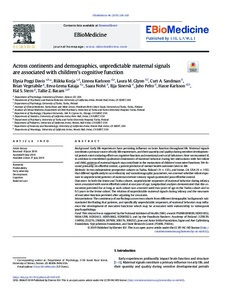Across continents and demographics, unpredictable maternal signals are associated with children's cognitive function
Elysia Poggi Davis; Riikka Korja; Linnea Karlsson; Laura M.Glynn; Curt A. Sandman; Brian Vegetabile; Eeva-Leena Kataja; Saara Nolvi; Eija Sinervä; Juho Pelto; Hasse Karlsson; Hal S.Stern; Tallie Z.Baram
https://urn.fi/URN:NBN:fi-fe2021042823934
Tiivistelmä
Background: Early life experiences have persisting influence on brain function throughout life. Maternal signals constitute a primary source of early life experiences, and their quantity and quality during sensitive developmental periods exert enduring effects on cognitive function and emotional and social behaviors. Here we examined if, in addition to established qualitative dimensions of maternal behavior during her interactions with her infant and child, patterns of maternal signals may contribute to the maturation of children's executive functions. We focused primarily on effortful control, a potent predictor of mental health outcomes later in life.
Methods: In two independent prospective cohorts in Turku, Finland (N = 135), and Irvine, CA, USA (N = 192) that differed significantly in race/ethnicity and sociodemographic parameters, we assessed whether infant exposure to unpredictable patterns of maternal-derived sensory signals portended poor effortful control.
Outcomes: In both the Irvine and Turku cohorts, unpredictable sequences of maternal behavior during infancy were associated with worse effortful control at one year of age. Longitudinal analyses demonstrated that this association persisted for as long as each cohort was assessed-until two years of age in the Turku cohort and to 9.5 years in the Irvine cohort. The relation of unpredictable maternal signals during infancy and the measures of executive function persisted after adjusting for covariates.
Interpretations: The consistency of our findings across two cohorts from different demographic backgrounds substantiated the finding that patterns, and specifically unpredictable sequences, of maternal behaviors may influence the development of executive functions which may be associated with vulnerability to subsequent psychopathology.
Kokoelmat
- Rinnakkaistallenteet [29335]
